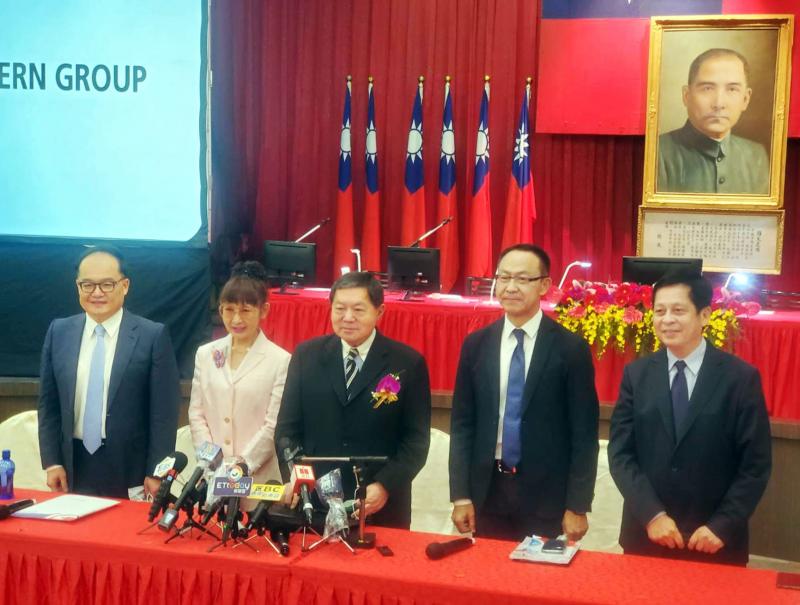The government must be expeditious with its proposed second round of stimulus vouchers to boost domestic demand, Far Eastern Department Stores Ltd (遠東百貨) chairman Douglas Hsu (徐旭東) said yesterday.
“The government has to move fast to give the post-[COVID-19] pandemic economy a boost,” Hsu said at the company’s annual general meeting in Taipei. “As for the amount, while I am sure it has budget considerations, the more the better.”
The Triple Stimulus Vouchers program, launched in July last year, saw Taiwanese and even foreign permanent residents receive NT$3,000 of vouchers in return for putting in NT$1,000.

Photo: CNA
The program, which ended at the end of last year, garnered 99 percent participation, with NT$64.28 billion (US$2.29 billion) of vouchers redeemed by vendors, Ministry of Economic Affairs data showed.
Administration of the program, including printing and distribution, cost more than NT$2 billion, and a second round of at least the same size is being planned by the Executive Yuan, the ministry has said.
Vouchers are said to be more effective than cash handouts because they must be spent by an expiration date, giving the economy the maximum boost and preventing funds from going into savings.
National Central University professor Dachrahn Wu (吳大任) said that a second round of stimulus vouchers would be welcome and distribution should be timed to coincide with the end of the COVID-19 alert.
The government needs to do more this time, especially for small businesses, as many of them do not have cash on hand, Wu said, adding that the government should extend more loans to small businesses so they can survive until the restrictions end.

Sweeping policy changes under US Secretary of Health and Human Services Robert F. Kennedy Jr are having a chilling effect on vaccine makers as anti-vaccine rhetoric has turned into concrete changes in inoculation schedules and recommendations, investors and executives said. The administration of US President Donald Trump has in the past year upended vaccine recommendations, with the country last month ending its longstanding guidance that all children receive inoculations against flu, hepatitis A and other diseases. The unprecedented changes have led to diminished vaccine usage, hurt the investment case for some biotechs, and created a drag that would likely dent revenues and

Macronix International Co (旺宏), the world’s biggest NOR flash memory supplier, yesterday said it would spend NT$22 billion (US$699.1 million) on capacity expansion this year to increase its production of mid-to-low-density memory chips as the world’s major memorychip suppliers are phasing out the market. The company said its planned capital expenditures are about 11 times higher than the NT$1.8 billion it spent on new facilities and equipment last year. A majority of this year’s outlay would be allocated to step up capacity of multi-level cell (MLC) NAND flash memory chips, which are used in embedded multimedia cards (eMMC), a managed

CULPRITS: Factors that affected the slip included falling global crude oil prices, wait-and-see consumer attitudes due to US tariffs and a different Lunar New Year holiday schedule Taiwan’s retail sales ended a nine-year growth streak last year, slipping 0.2 percent from a year earlier as uncertainty over US tariff policies affected demand for durable goods, data released on Friday by the Ministry of Economic Affairs showed. Last year’s retail sales totaled NT$4.84 trillion (US$153.27 billion), down about NT$9.5 billion, or 0.2 percent, from 2024. Despite the decline, the figure was still the second-highest annual sales total on record. Ministry statistics department deputy head Chen Yu-fang (陳玉芳) said sales of cars, motorcycles and related products, which accounted for 17.4 percent of total retail rales last year, fell NT$68.1 billion, or

In the wake of strong global demand for AI applications, Taiwan’s export-oriented economy accelerated with the composite index of economic indicators flashing the first “red” light in December for one year, indicating the economy is in booming mode, the National Development Council (NDC) said yesterday. Moreover, the index of leading indicators, which gauges the potential state of the economy over the next six months, also moved higher in December amid growing optimism over the outlook, the NDC said. In December, the index of economic indicators rose one point from a month earlier to 38, at the lower end of the “red” light.